
Frontiers in Soil Science
Scope & Guideline
Cultivating insights for sustainable agriculture.
Introduction
Aims and Scopes
- Soil Health and Fertility:
Research on soil health encompasses studies on nutrient dynamics, soil organic matter, and the impact of different agricultural practices on soil fertility and productivity. - Soil Microbiology and Ecology:
Investigations into soil microbial communities, their interactions with plants, and their role in nutrient cycling and ecosystem services are central to understanding soil functionality. - Soil Pollution and Remediation:
Papers addressing contamination from heavy metals, plastics, and organic pollutants, along with strategies for bioremediation and sustainable management of polluted soils. - Climate Change and Soil Carbon Dynamics:
Studies exploring how soil processes influence carbon storage and greenhouse gas emissions, particularly in the context of changing climate conditions. - Innovative Soil Management Practices:
Research focused on sustainable practices such as biochar application, cover cropping, and organic amendments aimed at improving soil health and agricultural productivity. - Soil-Plant Interactions:
Examining the relationships between soil properties and plant growth, including studies on root-soil interactions and the effects of soil amendments on crop yields. - Technological Advances in Soil Science:
Utilization of advanced technologies such as remote sensing, machine learning, and soil mapping to enhance soil assessments and management strategies.
Trending and Emerging
- Soil Microbiome and Plant Interactions:
Increasing interest in the soil microbiome's role in enhancing plant nutrient uptake and resilience under stress conditions highlights its significance in sustainable agriculture. - Impact of Climate Change on Soil Systems:
Research examining how climate change affects soil properties, carbon dynamics, and greenhouse gas emissions is gaining traction, reflecting the urgency of addressing climate-related challenges. - Sustainable Agricultural Practices:
Emerging themes focus on the application of sustainable practices such as agroecology, permaculture, and regenerative farming, which aim to improve soil health and ecosystem services. - Technological Innovations in Soil Science:
The use of machine learning, remote sensing, and precision agriculture technologies is on the rise, enhancing soil assessment and management strategies. - Soil Contamination and Remediation Techniques:
A growing body of research is dedicated to understanding soil contamination issues and developing innovative bioremediation and phytoremediation techniques to restore soil health. - Interdisciplinary Approaches to Soil Science:
The integration of soil science with public health, nutrition, and socio-economic studies is emerging as a vital area of research, reflecting the interconnectedness of soil health and human wellbeing.
Declining or Waning
- Traditional Soil Classification:
Research focusing solely on traditional soil classification systems has decreased as interdisciplinary approaches integrating soil properties with ecological and agricultural outcomes gain prominence. - Purely Chemical Soil Analysis:
Studies centered exclusively on chemical analyses of soil without considering biological and physical aspects are less common, as holistic approaches are favored for understanding soil health. - Historical Soil Studies:
While historical soil studies have their significance, there seems to be a decline in papers solely focused on historical perspectives without contemporary applications or implications. - Single-Factor Studies:
Research that examines the impact of a single factor on soil properties or functions is declining, with a trend towards multi-factorial studies that consider the complex interactions in soil systems. - Conventional Agricultural Practices:
There is a noticeable decrease in publications advocating conventional agricultural practices, as the focus shifts towards sustainable and regenerative practices that enhance soil health.
Similar Journals

BIOLOGY AND FERTILITY OF SOILS
Enhancing Soil Ecosystems Through Rigorous ResearchBIOLOGY AND FERTILITY OF SOILS, published by Springer, is a leading international journal dedicated to advancing the field of soil science with a focus on the intersection of biological processes and fertility management. With its ISSN 0178-2762 and E-ISSN 1432-0789, this journal serves as a key resource for researchers and professionals alike, reflecting its esteemed status in the community, evidenced by its Q1 rankings in Agronomy and Crop Science, Microbiology, and Soil Science. Covering a broad range of topics from soil health to sustainable agricultural practices, the journal's significant impact factor underscores its critical role in driving innovative research in the domain. While not offering Open Access options, it features rigorous peer-reviewed research that spans decades, converging influential studies from 1985 to 2024. Located in Germany with offices in the United States, the journal maintains a strong international presence, providing insights that enhance the understanding and management of soil ecosystems crucial for sustainable agriculture. Researchers aiming to expand their knowledge on soil biology and fertility will find this journal an invaluable asset.

Soil Science Annual
Pioneering sustainable solutions through soil research.Soil Science Annual, published by Polskie Towarzystwo Gleboznawc, is an esteemed open-access journal dedicated to advancing the field of soil science and related disciplines. With its ISSN 2300-4967 and E-ISSN 2300-4975, this journal has been pivotal since its inception in 2012, providing a vital platform for researchers, professionals, and students to share innovative findings and insights. The 2023 Scopus rankings place the journal in Q2 for Earth and Planetary Sciences (miscellaneous), and Q3 for both Environmental Science (miscellaneous) and Soil Science, underscoring its influence and contribution to these fields. Housed in Warsaw, Poland, the journal fosters scholarly dialogue and dissemination of research findings critical to understanding soil mechanics, conservation practices, and sustainable land use. With its open-access model, Soil Science Annual ensures that research is accessible to a broad audience, encouraging collaboration and innovation in tackling global environmental challenges.

Biochar
Unlocking the Potential of Biochar for a Greener TomorrowWelcome to Biochar, an esteemed academic journal dedicated to the exploration and advancement of biochar technology and its applications across multiple fields. Published by SPRINGER SINGAPORE PTE LTD, this journal serves as a vital platform for disseminating high-quality research that addresses the critical intersection of environmental science, soil health, and sustainable materials development. With a commendable Q1 ranking in the fields of Biomaterials, Environmental Science, Pollution, and Soil Science, Biochar is recognized for its significant impact, as evidenced by its placement in the upper percentiles across various Scopus rankings. Researchers and professionals in agricultural and biological sciences will find valuable insights and innovative methodologies that promote sustainable practices and enhance soil quality. This journal, operating from its base in Germany, is committed to fostering a collaborative environment where cutting-edge research can inform policy and practice. Engage with us as we strive to advance the science of biochar from 2019 to 2024 and beyond.
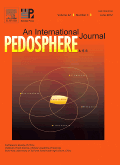
PEDOSPHERE
Pioneering Insights into Soil EcosystemsPEDOSPHERE, published by SCIENCE PRESS, is a leading journal in the field of Soil Science, holding a prestigious position in the Q1 category as per the latest evaluations, reflecting its high impact and relevance in the domain. Established in 1996, this journal is committed to advancing our understanding of soil-related processes and their interactions with various environmental components, providing a platform for innovative and high-quality research. With an impressive rank of #13 out of 159 in the Scopus classifications for Agricultural and Biological Sciences, PEDOSPHERE reaches the 92nd percentile, indicating its significance among scholarly publications. Although the journal operates under traditional access options, it remains an essential resource for researchers, professionals, and students keen on exploring the complexities of soil dynamics and sustainability. By bridging interdisciplinary methodologies and fostering collaboration, PEDOSPHERE plays a vital role in addressing global challenges related to soil management, conservation, and ecological balance.
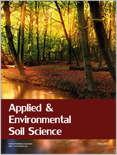
Applied and Environmental Soil Science
Exploring innovative pathways to enhance soil management practices.Applied and Environmental Soil Science, an esteemed journal published by HINDAWI LTD, focuses on disseminating high-quality research in the fields of soil science and environmental applications. With an ISSN of 1687-7667 and an E-ISSN of 1687-7675, this open-access journal has been a vital resource for the academic community since its inception in 2009. As of 2023, it holds a commendable position in the Q2 category for both Earth-Surface Processes and Soil Science, highlighting its impact in these crucial disciplines. The journal’s rankings further affirm its significance within the field, being placed 61st in Earth and Planetary Sciences and 58th in Agricultural and Biological Sciences. Researchers and practitioners alike benefit from the collaborative platform it offers for sharing innovative studies essential for sustainable soil management and environmental integrity. With a focus on advancing knowledge and fostering interdisciplinary dialogue, Applied and Environmental Soil Science stands as a crucial pillar for scholars and professionals dedicated to addressing the pressing challenges of soil and environmental health.
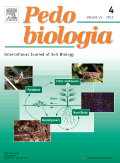
PEDOBIOLOGIA
Championing the Science of Soil and Its Ecological RelevancePEDOBIOLOGIA, published by Elsevier GmbH, is a prestigious journal dedicated to advancing the fields of Ecology and Soil Science. Renowned for its authoritative contributions to understanding soil biology and its ecological implications, PEDOBIOLOGIA has maintained a strong impact within the academic community, evidenced by its Q2 ranking in both Ecology, Evolution, Behavior and Systematics and Soil Science categories in 2023. The journal has a broad scope that encompasses fundamental and applied research on the interactions between soil organisms and their environment. Since its inception in 1977, it has provided vital insights into the biological functions of soil, serving as a crucial resource for researchers, professionals, and students alike. Although not an Open Access journal, its publications are accessible through various academic libraries, ensuring that cutting-edge research continues to be available to a global audience. Located in the vibrant academic hub of Munich, Germany, PEDOBIOLOGIA not only emphasizes the importance of soil ecosystems but also fosters interdisciplinary dialogue, making it an essential platform for innovative studies in the field.
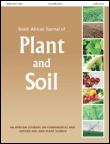
South African Journal of Plant and Soil
Advancing sustainable practices in plant and soil science.South African Journal of Plant and Soil is an esteemed academic publication dedicated to advancing the fields of Ecology, Plant Science, and Soil Science. Published by TAYLOR & FRANCIS LTD in the United Kingdom, this journal has been a vital resource since its inception in 1984, providing a platform for innovative research and scholarly articles that address critical issues in plant and soil management. With a current impact factor placing it in the Q3 category according to the 2023 rankings, it occupies an influential position within the academic community, especially amongst researchers focused on agricultural and environmental sciences. Although not an open-access journal, it remains accessible to a broad audience through libraries and institutions that recognize its value in facilitating ecologically and environmentally focused discussions. The journal's ongoing commitment to publishing high-quality research ensures that it plays a pivotal role in nurturing knowledge and fostering advancements in sustainable practices across southern Africa and beyond.

Journal of Soil Science and Plant Nutrition
Pioneering insights in soil science and plant nutrition.The Journal of Soil Science and Plant Nutrition, published by SPRINGER INT PUBL AG, is a premier academic journal dedicated to advancing the fields of agronomy, plant science, and soil science. With an impressive Q1 ranking in both Agronomy and Crop Science and Plant Science, alongside a Q2 ranking in Soil Science, this journal stands at the forefront of innovative research and knowledge dissemination. Annually indexed in key databases, it provides a platform for high-quality research articles that explore the complex interactions between soil health and plant nutrition, contributing significantly to sustainable agricultural practices. Although it does not offer open access options, the journal is accessible through various academic institutions and libraries, ensuring a wide readership. With its emphasis on impactful findings, the journal is an essential resource for researchers, professionals, and students aiming to further their understanding and application of soil and plant science in an ever-evolving global context.
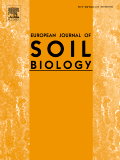
EUROPEAN JOURNAL OF SOIL BIOLOGY
Connecting Science and Soil for a Sustainable FutureThe EUROPEAN JOURNAL OF SOIL BIOLOGY is a leading publication through ELSEVIER FRANCE-EDITIONS SCIENTIFIQUES MEDICALES ELSEVIER, renowned for its rigorous contribution to the fields of soil science, microbiology, and insect science. Established in 1993 and continuing to thrive until 2024, this journal is recognized for its high academic standards, achieving a prestigious Q1 ranking across multiple disciplines including Insect Science, Microbiology, and Soil Science in 2023. With a Scopus rank placing it in the top tiers of relevant categories, the journal serves as a vital platform for disseminating groundbreaking research and advancements in soil biology. Although currently not an open access journal, it offers valuable insights to researchers, professionals, and students, enhancing understanding and fostering innovative solutions for global soil health challenges. The journal's ISSN is 1164-5563 and its E-ISSN is 1778-3615, offering a wealth of knowledge from an esteemed publisher situated in France.
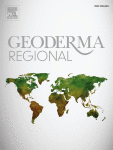
Geoderma Regional
Advancing soil science for a sustainable future.Geoderma Regional is a premier scholarly journal dedicated to advancing the field of Soil Science. Published by Elsevier in the Netherlands, this journal serves as a vital platform for disseminating high-quality, peer-reviewed research that spans the complexities of soil management, behavior, and the implications of soil processes on environmental sustainability. Since its inception in 2014, Geoderma Regional has achieved an impressive position within the academic community, holding a Q1 ranking in the field of Soil Science, placing it among the top 20% of journals in its category according to SCOPUS rankings. This journal is particularly distinguished for its significant contributions to the nexus between agriculture and biological sciences, reflected in its rank of #33 out of 159 in this field with a commendable 79th percentile. Researchers, professionals, and students alike will appreciate the journal's commitment to open discourse and innovative research agendas as it aspires to enhance our understanding of soil dynamics, addressing critical issues facing our planet.